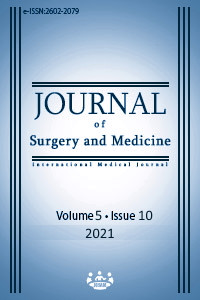Investigation of work-related tension levels and related factors in healthcare workers
Keywords:
Healthcare workers, Work-related tension, Contagiousness anxietyAbstract
Background/Aim: Factors such as heavy workload and infectious diseases cause Work-Related Tension (WRT) in healthcare workers. This study aimed to evaluate the Work-Related Tension Scale (WRTS) scores of healthcare workers to assess whether they are concerned about infecting their families and themselves as a result of their work and whether they are thinking about being fired or changing professions if they have this anxiety. Methods: A total of 300 healthcare professionals working in a university hospital were included in this cross-sectional study. Data were obtained with the work-related stress scale (WRTS) and descriptive questionnaire and analyzed using SPSS 20.0 software. A P<0.05 was considered statistically significant. Descriptive statistics and ANOVA analysis were used during statistical evaluation. Results: The mean WRTS score (yes: 42.71) of the participants who had anxiety about infecting their families because of their jobs was significantly higher than that of the other groups (partially: 41.49, no: 38.16) (P<0.001). The mean WRTS score (yes: 42.27) of the participants who had anxiety about infecting themselves was significantly higher than those who did not (partially: 40.9, no: 38.21) (P=0.012). Healthcare workers who wanted to resign due to this concern had a considerably higher mean WRTS score (yes: 43.70) than those who wanted to keep working (partially: 42.93, no: 39.86) (P<0.001). Conclusion: Healthcare workers are concerned about infecting themselves and their families because of their jobs. As a result of this concern, their WRT levels are increased, and they are alienated from their work. Measures to increase effective protection against infectious diseases and stress management are needed.
Downloads
References
Boswell CA. Work stress and job satisfaction for the community health nurse. Journal of Community Health Nursing. 1992;9(4):221-7.
Clegg A. Occupational stress in nursing: a review of the literature. Journal Of Nursing Management. 2001;9(2):101-6.
Sultana A, Sharma R, Hossain MM, Bhattacharya S, Purohit N. Burnout among healthcare providers during Covid-19: Challenges and evidence-based interventions. Indian J Med Ethics. Published online on 2020 July 4;1:1-4 DOI:10.20529/IJME.2020.73.
Aslan H, Aslan O, Kesepara C, Alparslan N, Ünal M. Kocaeli’nde bir grup sağlık çalışanında işe bağlı gerginlik, tükenme ve iş doyumu. Toplum ve Hekim. 1997;12(82):24-9.
Beyoğlu MM, Kuşaslan DA. Examination of the relationship between health literacy, concern, and anxiety in adults with diabetes mellitus or hypertension and comparison with individuals without chronic disease. Journal of Surgery and Medicine. 2020;4(6):456-9.
Bakanlığı TS. Temel Sağlık Hizmetleri Genel Müdürlüğü Bulaşıcı Hastalıkları Daire Başkanlığı. HIV/AIDS Surveyans verileri. Ankara: T.C. Sağlık Bakanlığı Halk Sağlığı Genel Müdürlüğü Bulaşıcı Hastalıklar Dairesi Başkanlığı, 2004.
Baykam N. Sağlik çalişanlarina temas, enteral ve damlacik yoluyla bulaşan infeksiyonlar ve korunma yollari. Sağlik çalişanlarinin sağliği 1. Ulusal kongresi. Ankara: 1999; p. 62.
Wu J, Ping Z. Association of COVID-19 Disease Severity with Transmission Routes and Suggested Changes to Community Guidelines. Preprints 2020, 2020030246 (doi: 10.20944/preprints202003.0246.v1).
Alan S. Hastane enfeksiyonlarindan korunmada birimlerin yapilanma. havalandirma, temizleme ve dezenfeksiyon esaslari, hastane enfeksiyonlari: Korunma Ve Kontrol Sempozyum Dizisi. 2008;(60):221-37.
Kumar PS, Dhanapal CK, Ravı S, et al. Prevention and control of infections. international Journal of Pharma and Bio Sciences. 2011;(2):145-54.
Galbraith N, Boyda D, McFeeters D, Hassan T. The mental health of doctors during the COVID-19 pandemic. BJPsych Bulletin. 2021;45(2):93-7.
Sarp N. Hekim ve stres yönetimi. Ankara Üniversitesi Tip Fakültesi Mecmuasi. 2000;53(2):133-7.
Revicki, Dennis A, MAY, Harold J, Whıtley, Theodore W. Reliability and validity of the Work-Related Strain Inventory among health professionals. Behavioral medicine. 1991;17(3):111-20.
Cai H, Tu B, Ma J, Chen L, Fu L, Jiang Y, et al. Psychological impact and coping strategies of frontline medical staff in Hunan between January and March 2020 during the outbreak of coronavirus disease 2019 (COVID-19) in Hubei, China. Medical Science Monitor: International Medical Journal Of Experimental And Clinical Research. 2020;26:e924171-1.
Dai Y, Hu G, Xiong H, Qiu H, Yuan X. Psychological impact of the coronavirus disease 2019 (COVID-19) outbreak on healthcare workers in China. MedRxiv. 2020;1:1-22.
Alimoglu MK, Donmez L. Daylight exposure and the other predictors of burnout among nurses in a university hospital. International Journal of Nursing Studies. 2005;42(5):549-55.
Tokuç B, Turunç Y, Ekuklu G. Edirne’de ambulans çalişanlarinin anksiyete, depresyon ve işe bağli gerginlik düzeyleri. TTB Mesleki Sağlık ve Güvenlik Dergisi. 2011;11(42):39-44.
Inter-Agency Standing Committee, et al. Briefing note on addressing mental health and psychosocial aspects of COVID-19 Outbreak- Version 11. 2020.
Erçevik R. Hemşirelerde işe bağlı gerginlik, tükenmişlik düzeyleri ve etkileyen faktörler. Yüksek Lisans Tezi. Haliç Üniversitesi, Sağlık Bilimleri Enstitüsü, Hemşirelik Ana Bilim Dalı; 2010.
Arikan D, Karabulut N. Hemşirelerde işe bağli gerginlik ve bunu etkileyen faktörlerin belirlenmesi. Anadolu Hemşirelik ve Sağlık Bilimleri Dergisi. 2004;7(1):10-7.
Aslan SH, Alparslan ZN, Aslan RO, Kesepara C, Ünal M. İşe bağlı gerginlik ölçeğinin sağlık alanında çalışanlarda geçerlik ve güvenirliği. Düşünen Adam. 1998;11(2):4-8.
Vatansever İ. Trakya Üniversitesi Sağlık Uygulama ve Araştırma Merkezinde çalışan araştırma görevlilerinde işe bağlı gerginlik düzeylerinin değerlendirilmesi. Uzmanlık Tezi, Trakya Üniversitesi Tıp Fakültesi, Aile Hekimliği Anabilim Dalı; 2016.
Downloads
- 162 313
Published
Issue
Section
How to Cite
License
Copyright (c) 2021 Levent Çevik, Dilek Avcı
This work is licensed under a Creative Commons Attribution-NonCommercial-NoDerivatives 4.0 International License.
















